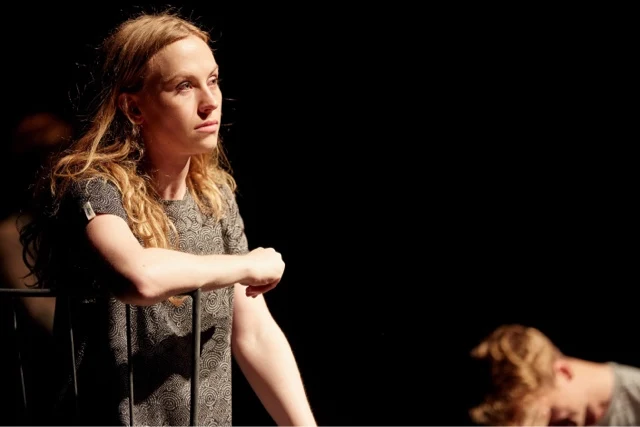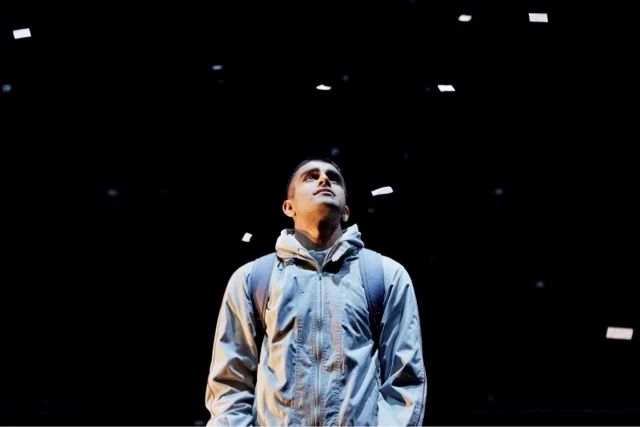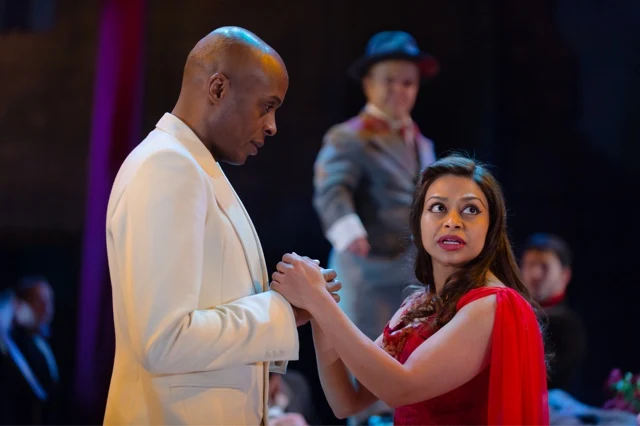Design by RSC Visual Communications
Saturday was the first official
captioned day at (the new)
The Other Place (TOP) – thank you,
Stefanie Bell…! – although I appeared to be the only one sitting in the specially-reserved seats at the back of The Studio Theatre… – and, with Early‑Bard (sorry) tickets going for a mere
70p a pop (the price they were when
Buzz Goodbody’s magical Tin Hut originally opened for business in 1974), I decided to see all of the
Making Mischief festival’s four performances:
Revolt. She Said. Revolt Again. – then, after the shortest of breaks,
Always Orange – and, in the evening,
Fall of the Kingdom, Rise of the Foot Soldier, followed, finally, by
Revolt…. Again. (Ahem.)
I may be wrong, but I believe that most visitors to Stratford-upon-Avon – and then the RSC – come expecting non-stop Shakespeare; or maybe – if the RST is sold out – (will settle for) one of his less-famous contemporaries at the other, older (more interesting) end of the building. (After all, this
is the universal, gravitational centre of
Bardolatry.) And yet some of the most memorable productions I have seen here recently have stemmed from the pens of living writers – off the top of my head:
Hecuba,
Oppenheimer, and Mark Ravenhill’s imaginative reworking of Brecht’s
A Life of Galileo.
This is not to say those “visitors” are in any way wrong; nor that the RSC isn’t a great (maybe the best) purveyor of
English Renaissance theatre. Just that the place (and the organization) has a depth and breadth to its skills and repertoire that I think would surprise quite a few: were they to pay attention, for a while, to the many talents both before and
behind the curtain. And with
Erica Whyman as Deputy Artistic Director – “taking a particular lead on the development of new work [and] on extending equality and diversity across all RSC activities” – even I am beginning to expect the unexpected. As I often say: this is A Good Thing!
This is not well, my lord, this is not well.
What say you to it? Will you again unknit
This churlish knot of all-abhorred war?
And move in that obedient orb again
Where you did give a fair and natural light,
And be no more an exhal’d meteor,
A prodigy of fear, and a portent
Of broached mischief to the unborn times?
– Shakespeare: Henry IV, part I (V.i.14-21)
This too-short
Making Mischief festival – building on the success of 2014’s
Midsummer Mischief – is just one example of such a positive (hydra-headed – and yet somehow utterly cohesive: thematically, if not quite qualitatively) creature. Although, as you
should expect, this is “mischief” of a dark, Puckish kind –
full of calamities, catastrophes; wicked actions, evil deeds, harmful schemes… – rather than of japery and jollity. And these first three plays –
Joanne, the fourth and final, only runs for three performances, sadly, later this week… – left me and my mind so instantly boggled (and in so many ways) that I struggled to put together anything coherent immediately afterwards (as is my wont). Hence the uncharacteristically late (meaning tardy, rather than my usual insomnia-generated) appearance of this review. Some of you may also notice that, the greater the production, the fewer words I manage to string together….
I had entered TOP as it opened, at 10:00 – expecting a queue for those bargain tickets (£2.80 for a whole day of challenging theatre: wow!) – but I needn’t have worried. I was second in line (and managed to grab copies of the play texts – which cost just a tad more! – at the same time). And then I basically set up camp there, for the day: leaving – with a few (loo) breaks; a smattering of really interesting conversations; several coffees; an excellent chickpea wrap; and a smidgen of cake: all for good behaviour… – over twelve hours later! [After a 97‑hour migraine, I needed urgently to make friends with my iPad again; and at least
pretend to look busy: trying to catch up with my ever-spiralling to-do list – despite a need, in reality, to take things physically easy.] I had also entered wearing my
why, this is hell, nor am I out of it. T-shirt: which, as the day flowed by me, seemed increasingly apposite.
Review. He wrote. Review again.
Revolt – The company – photo by Richard Lakos/RSC
This review is not well behaved.
The Bard of Tysoe examines the irony, cunning linguistic stunts, and increasing lack of connection and conviction, which disturbed him (but not as expected) for an hour, twice, on the sixth of August; and asks what’s stopping him from having a ball (or two).
I really, really wanted to fall for
Revolt. She Said. Revolt Again. by Alice Birch (and not just to get another rubber stamp on my Feminism loyalty card). It seemed a rather palpable hit, the first time around. And I rather enjoy messing, er,
around with language (good, bad, or anywhere in between – however you wish, personally, to define those adjectives); as well as truly loving what Erica Whyman – who directs this – has brought to the RSC: with her programming, her insight,
inclusivity, and the obvious change of culture.
However, from the perspective of someone who writes (but only to keep himself living – not for one), I found the manipulation of language, here, just too clever for its own good. [I was tempted to write that Birch uses a sledgehammer – actually a fire-axe… – to try and crack nuts: but it came out all wrong.] And yet, whole sections of the text were – surprisingly (not for me, as reviewer; but for you, dear reader) – truly brilliant.
Revolt – Emmanuella Cole; Emma Fielding – photo by Richard Lakos/RSC
Just before I went in, I had written in an email – on a slightly different subject – that “What it all boils down to is the ‘communication’… the connection… – but that communication/connection must be a two-way process: the [viewer] has to comprehend what the performer is telling them”. And this play demonstrates such a need in many, many ways – without providing any answers: either internally- or externally-evoked. [Please note: I am not saying that is A Bad Thing.] It also – for a male viewer (despite my self-awarded feminist credentials) – is just a little (but only, disappointingly, a little) discomfiting. As the short programme states:
This play is not well behaved.
Alice Birch examines the language, behaviour and forces that shape women in the 21st century and asks what’s stopping us from doing something truly radical to change them.
However, that signposted bad behaviour – maybe I just am a typical, old-fashioned bloke, after all: who just
thinks he ‘gets’ equality because of his overlapping membership of several minorities…?! (see
Fall of the Kingdom – where it may all get sort of ‘
meta’…) – feels like an excuse (almost – and I’m sorry (really?) to use such the C‑bomb, here… – a c‑c‑c‑c‑contrivance). It may have been “discomfiting” – and, in my ever-so-’umble opinion (whatever
that’s worth), rightly so – but it never felt
genuinely shocking (a state which it seemed ravenously to aspire to); nor
that radical (ditto). Its overall impact, therefore, for me, was actually quite weak. [As Miles Davis once posited quite brilliantly:
So What.]
Yes, there were those individual scenes of excellence, and fleeting moments of engaging emotion and real humour: which, of course, I did connect with. However, I felt the play’s use of – although it felt like its descent into… – what I can only describe as Beckettian literary impressionism (aren’t I a clever boy?) was something of an overwrought and target-missing soggy something-or-other. (Must try softer.)
Revolt – Beth Park – photo by Richard Lakos/RSC
In other words, this was a drama that I felt stumbled too many times, before eventually pratfalling waaaaay short of its potential. It didn’t help that all its working-outs were all-too-visible. For instance, its non-too-subtle overuse of repeated motifs (bluebells, potatoes, watermelons – basically, my usual weekend Waitrose shopping list…) is all too self-knowing and obvious. And, to be really blunt, I felt I was being manipulated – which is, in the end (ba‑dum tish), why I wasn’t moved. [I really do like to think for myself, y’know – despite what may appear as a consistent lack of evidence of such activity on these pages.] And the blurry projected text – instructions…? (but for whom…?) – just felt downright patronizing. (Maybe it’s
Cymbeline…?)
Perhaps this – after all is said, done; kicked the (red) bucket, etc. – is the point? As a man (cough), perhaps I’m
supposed to feel like this? But I didn’t need to engage my mind or my heart that much; and when I did, it wasn’t with any consistency. This, I’m afraid, therefore did not fulfil enough of the
Bardic dramatic requisites to win me over. [Shocking, eh? (Or not.)]
Revolt – Emmanuella Cole; Emma Fielding – photo by Richard Lakos/RSC
Strangely, I was glad, though, that I saw it twice on the same day. To be honest (and serious), I think it crucial that works like this exist to remind us that our society has not moved on much (unlike moi) from its patriarchal, paternalistic roots. I just don’t think this is the mechanism by/through which converts will be won. However, it did – or appears to have, in my tiny, er, mind – inspire the other two dramas it bookended (expect raves galore, instead of barely-concealed sardonicism); as well as some truly magnificent, brave and breathtaking performances from Beth Park, Emma Fielding, Emmanuella Cole, and odd-person-out – “And we’ll eradicate all men…” – Robert Boulter. [Normal service will be resumed after the break.]
Revolt – Robert Boulter – photo by Richard Lakos/RSC
The future’s bleak…
Sweet flowering peace, the root of happy life,
Is quite abandoned and expulst the land;
Instead of whom ransacked constraining war
Sits like to ravens upon your houses’ tops;
Slaughter and mischief walk within your streets,
And, unrestrained, make havoc as they pass;
The form whereof even now myself beheld
Upon this fair mountain whence I came.
For so far of as I directed mine eyes,
I might perceive five cities all on fire,
Corn fields and vineyards, burning like an oven;
And, as the reaking vapour in the wind
Turned but aside, I like wise might discern
The poor inhabitants, escaped the flame,
Fall numberless upon the soldiers’ pikes.
– Shakespeare: Edward III (III.ii.47-61)
Orange – Donna Banya (Amna) – photo by Richard Lakos/RSC
I described
Always Orange as “devastating… important and necessary theatre” as I sat down in
Susie’s Cafe Bar to recover (not that I think I will, could, or want to…). Having written twice, recently –
Doctor Faustus, of course; and then
Mrs Shakespeare – about “theatre as therapy”, this was probably the toughest (but most rewarding) of the three plays to sit through, for me: its depiction of
post-traumatic memory searingly (and,
in my case, tear-jerkingly, shoulder-shudderingly) accurate – and perfectly portrayed by the mesmerizing Ifan Meredith, as Joe (“a British man”).
Orange – Ifan Meredith (Joe) – photo by Richard Lakos/RSC
Fraser Grace’s writing is of the highest quality and laser-guided precision (the prologue reads as poetry; yet the craft is invisible). And, although he describes, in the (post)script, the perils of being ‘open’ – apart from the first and last, “the scenes… can be presented in any order” – I would really like to see the drama again (and again)
with some of that chance shuffling (what I think of as ‘
aleatoric’ art). This, perhaps, would
emphasize “Joe’s confusion as a trick of memory – a product purely of his psychological state” more – something that is apparent, but not quite pivotal (from my extremely subjective perspective), in the ‘fixed’ version presented here.
Orange – Bally Gill (No Name) – photo by Richard Lakos/RSC
At the risk of
imposing my own (so proximate that my face is identifiable from the marks left behind on the “so much glass in this place”) interpretation (or even will) on the play: with Joe so obviously the central character, I believe such variability would go some way to reflecting and stressing (if not actually explaining) that his “head and confidence is scrambled not because he is by nature a confused person, but because of an immensely traumatic event that happens in the physical world.” [And yes –
as the founding member of Marloweholics Anonymous – I
would be prepared to watch lots of these different iterations one after another.]
Orange – Bally Gill (Parvendra); Sam Cole (Niall); Bianca Stephens (Lorna) – photo by Richard Lakos/RSC
The company, here, is uniformly stunning – a perfect match for those perfect, powerful words. Not just the actors; but the creative team, too. There are some magical, abrupt, shocking – truly shocking – silences. Everything – whatever sense it affects – is there for a reason. This is so real. It is “how we live now” – but feels like it was written tomorrow. The unexpected connections the play makes are so utterly, chillingly plausible. Its switches of perspective non-judgmental and almost empathic.
Orange – Tyrone Huggins (Farouk) – photo by Richard Lakos/RSC
I don’t want to go into too much detail, for fear of revealing too much. All I would say is that this – by the slimmest of margins (see below) – is the one festival play I need to (and will) see again. (I would also suggest that you need to, as well.) This salient production defines why theatre is so crucial. It is also the RSC at the very top of its (perhaps unexpected) game.
Orange – Syreeta Kumar (Rusha) – photo by Richard Lakos/RSC
By the way: playing Joni Mitchell’s exquisite
A Case of You as we left the theatre was a tiny act of apposite genius… – albeit one amongst so many.
Please don’t let this be my England…
Kingdom – Donna Banya (Aisha) – photo by Richard Lakos/RSC
The journey to write this play has been one of mixed emotions.
I don’t have all the answers.
What I do know is this;
We must get angry. We must stay angry. We must get organised.
Anger without strategy is futile.
Above all else we must connect, hear and protect each other.
Silence is not an option. It is in fact complicitness.
We are more powerful than we know.
Collectively.
Kingdom – Syreeta Kumar (Shabz); Laura Howard (Hawkins); Ifan Meredith (Archie) – photo by Richard Lakos/RSC
Utilizing most of the same brilliant cast of Always Orange, this similarly whacked me in the chest and head with vicious aptness. Not for personal reasons, this time; but topical ones. Donna Banya as Aisha was particularly persuasive – shattering, even. And yet it was Syreeta Kumar, as Shabz, who usurped my soul – just ahead of Laura Howard as Hawkins: whose disintegration, in parallel with devastating events, crumpled with transparent truth. Again, though, it is the cumulative forcefulness of the whole company – beginning, of course, with the playwright’s deep incisions into contemporary urban society (“Set in London. The belly of our beast. Heightened and dangerous.”) – which makes this so convincingly potent.
Kingdom – The company – photo by Richard Lakos/RSC
The repeated use of cubes – of various shapes, sizes, materials, contents – was a disquieting leitmotiv: but one, I think, which communicates in many ways. Not only is this a world of rigidly-compartmentalized thoughts; finite resources; fractured factions; of high-rise, faceless, empty blocks; it is one of fortification and hard edges (linking directly back to
Revolt…) – and one where such established (establishment?) solidity needs to be continually softened, interrogated, challenged, disrupted; where boxes, containers (of any kind), need emptying, their contents modified or replaced; where, instead of being scattered, organization and cohesion could render them a concrete force for change. Thus, the
masked Chorus was devastating in its tripartite, opaque, shape-shifting anonymity – especially contrasted with the clarity of the intensely personal portraits at the drama’s heart….
Kingdom – Laura Howard (Hawkins); Tyrone Huggins/Ifan Meredith/Bally Gill (Chorus) – photo by Richard Lakos/RSC
Go. Just go. Okay? And then get angry. Then organized. Really angry. And really, really organized.
Anger is to make you effective. That’s its survival function. That’s why it’s given to you. If it makes you ineffective, drop it like a hot potato.
Kingdom – Laura Howard (Hawkins); Ifan Meredith (Archie) – photo by Richard Lakos/RSC
Erica Whyman writes in the introduction to the scripts of
Orange and
Kingdom that they were “commissioned… in response to the provocation ‘What is unsayable in the 21st Century?’”. The answer – as I think it should be – is
absolutely nothin’. And both these telling dramas demonstrate this rejoinder not just meaningfully and successfully; but, as Whyman says, “with exhilarating honesty [and] elegant and determined theatricality.” Buzz, I am sure, would be proud. Me? I’m still quite thrillingly boggled.
It is perhaps the artist’s most urgent responsibility – to disrupt, to perturb, to disconcert in order to reveal new ways of imagining the world – to make serious mischief. I hope these plays encourage us all to see a little differently.















































